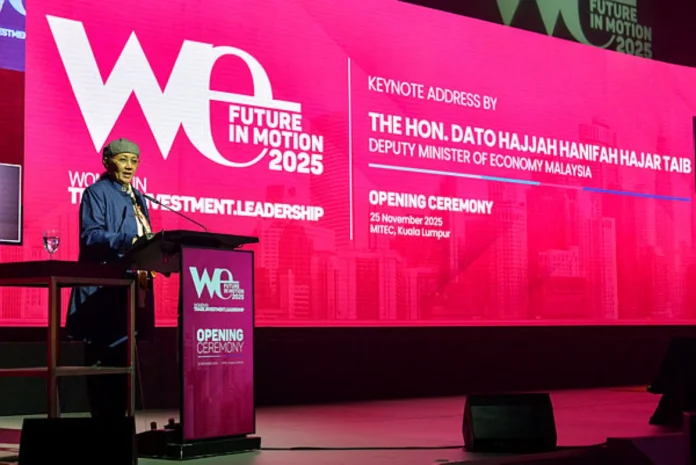Support for women in tech and MSMEs boosts Malaysia’s economy and global trade opportunities, says Hanifah Hajar.
KUALA LUMPUR: Women need to be recognised as innovators and leaders, and by enhancing digital skills and fostering supportive industry environments, they can enter high-growth sectors and play a vital role in Malaysia’s technological advancement.
Deputy Minister of Economy Datuk Hanifah Hajar Taib said that women currently constitute about 35 per cent of Malaysia’s tech workforce, which is higher than many global averages.
“Women-owned businesses already make up 20.1 per cent of all establishments in Malaysia, employing nearly one million people, especially in the services sector,” she said in her keynote address at We2025: Future In Motion: Women In Trade, Investment, Leadership, a conference focused on empowering women in trade, investment and leadership roles, here today.
She also said that Malaysia has always been a trading nation and that its prosperity is closely tied to how well Malaysian firms connect to global value chains.
“Women’s entrepreneurship is a key driver of inclusive economic growth, and this strength should be connected to global opportunities,” she added.
To further support women entrepreneurs, Malaysia’s micro, small and medium enterprises (MSMEs) ecosystem is expanding and becoming more export-oriented.
However, Hanifah Hajar said that challenges remain for women particularly in access to financing, digital adoption, market access, and global connectivity.
Through initiatives such as the Malaysia External Trade Development Corporation’s Women Exporters Development Programme, SME Corporation Malaysia’s Export Enhancement Programme, and schemes like MySMELady 2.0 under SME Bank Malaysia, efforts are underway to build export capabilities, widen digital access, and ease financing for women-led MSMEs.
These initiatives align with the priorities of the 13th Malaysia Plan to promote inclusive growth.
“Economic empowerment requires more than skills and opportunities. It calls for an enabling environment where transport access, public safety, digital infrastructure, childcare services, broadband connectivity, safe public spaces, and gender-responsive infrastructure play crucial roles.
“Malaysia continues to expand these systems to reduce barriers and create conditions for women to thrive across all parts of the economy, from urban centres to rural communities,” she added. – Bernama








